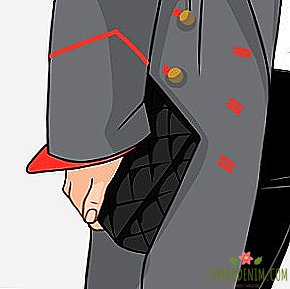Whip or Gingerbread: Why praise is much more effective than criticism
"How not to praise", “Criticism makes a person better,” “Praise is conceited,” did you also hear these phrases in childhood and in adulthood? Myths about the dangers of praise and the benefits of harsh critics are very tenacious. In the past twenty years, it has been customary to add “constructive” to the word “criticism”, although the essence of this most often does not change: sharp value judgments are still considered useful, and approval, compliments and praise are very dangerous. We understand whether it is true that one can be fooled with praise and relax too much, and the criticism motivates.
Text: Yana Shagova, psychologist

Doubtful use
Our society is permeated with the idea of heroism: to overcome, to suffer and endure is considered the norm. Harsh, border-breaking appraisals are also very common. It is not surprising that many people represent "constructive criticism" of just such, acting as a blow in the gut: it hurts and suddenly. But it's okay, because it is useful: first you will suffer unpleasant feelings, then you will be able to do it properly, you will grow up and develop, and it will be good.
But will it? Imagine that you have invested in something and thought it worked out well, and a significant person for you says: “Made very casually”, “I counted on more”, “Nobody wants to buy that”, “By I think your thought went the wrong way. " What feelings will it most likely cause you? Maybe the pain: "I wanted to be praised and supported, but I was kicked instead." Maybe the feeling of rejection: "I shared something good and personal and waited for my loved one to rejoice with me, and he laughed at me / got angry / spoke very skeptically." Anger may also arise: "Why did I share anything with you at all? You never appreciate me!" - or shame: "I’m forever doing stupid things, why bother to stick out at all", "Probably, my ideas are really bullshit, but I don’t imagine anything special." And at the end, as a result, sadness appears: “Well, I thought, this time I’ll finally do something worthwhile. Hmm,” or even despair: “Was it worth hoping that this time I had will something good come out? "
Suppose the interlocutor did not use harsh words that detract from your work, but only rationally pointed out the shortcomings of your idea, project, or anything else - even a recipe: "It would be logical to add other spices, this is Italian cuisine." But the essence of the message, despite a slightly more polite form, has not changed. You have been told that you have tried hard, that the result does not reach to some imaginary level, that you are disappointed with the interlocutor. So the feelings will still be similar, even if it may be weaker: sadness, pain, resentment, shame for yourself and for what you have done, anger. How can out of these feelings be born inspiration, the courage to do something again and generally do something? Right, no way.
Why criticism has not disappeared
The postulates that harsh, derogatory criticism is useful were in many respects “written” for a Soviet person. The social value, and sometimes even the condition of survival in a country where much was impossible, became the habit of not hanging out, not standing out, not attracting too much attention. The phrase “thinks a lot about itself” was almost an insult, while the children called each other “imaginary” and “zadakoy”. Under the conditions of strict rationing of appearance, words, political views and ways of thinking, creative abilities, the desire and ability to stand out, and even less entrepreneurship, the ability to invent something new and the ability to find your audience would rather endanger a person or make him an outsider.
In addition, the Soviet society, from which we inherited these ideas, was industrial - and success largely determined the discipline and adherence to well-known rules. It was clear how to advance in the service, how to make money on a car or get a cooperative apartment. There were consistently "cash" professions: an accountant, a translator, a reviewer.
In a tightly structured system, where the key to success is adherence to norms, criticism, and constant self-denial really help to adapt to what is happening. They return the person to the "rut", do not allow him to "go astray." If you bring up a child in this coordinate system, then praise, of course, is dangerous: it is believed that it will certainly lead to the fact that he will think too much of himself and will surely "roll down an inclined" or "go along a curved path." But criticism allegedly brings complete benefits, since the fear of standing out makes a person conformal, modest and suspicious - he thinks, no matter how wrong, not blurt out too much.

Relevant criticism
Who and when in this case can be criticized? There is another question: why? Do you want to educate a person, be it a child or an adult, teach him something, make him fit into social norms? If we are talking about an adult, then, of course, another question arises: why do you think that it is possible and necessary to change an adult person? But in any case, praise and approval of the correct, from your point of view, actions will be a more effective tool than criticism.
Perhaps, one of the few “legitimate” types of potentially harsh criticism is professional, which, of course, does not mean that reviews cannot hurt. But there is a big difference between it and the everyday criticism of creativity: familiar people say the second, and most often without a request, and often without a professional understanding of the issue.
In general, disapproval and criticism are clearly relevant only in two situations: when a person hurts others and when he hurts himself. It is clear that the line is blurred: a friend made a tactless remark in the general company and offended someone - is this a reason to criticize him in a private setting or do you need to keep silent? Definitely answer "yes" is possible only if the situation threatens someone's life. If a friend tells you that she is going to take a huge loan to start her own business, and she does not have experience in business and even have no one to consult with - this is perhaps the appropriate reason to express your concern. If a friend started skywalking and is going to climb a fifty-meter tower without insurance, you can and should honestly say that his plan frightens you.
In other cases, criticism and comments without a request would rather offend and will not bring any benefit. Do you think that a friend is ridiculously dressed, and it seems to him that he looks good - who of you is right? You have to believe that if a friend feels good, he is really all right. Now, if your friend turns to you for advice on how to act in everyday life, relationships or work, you will have a reason to delicately express your opinion. While there is no request - it is inappropriate.
"Careful, and you will praise that much"
The wonderful concept of “praise” or “praise”, it seems, was known to all Soviet educators. "Poorly written test on algebra. I praised you last time!" - The usual replica of the teacher. Paradox: failures were for some reason attributed to praise, and successes to the “timely” criticism: “I’ve been scolded, I immediately took up my mind and corrected the three.” But this is nothing more than an installation. It is known that cognitive abilities may decrease with regular stress. Harsh criticism and negative assessments can cause stress - and therefore, according to the logic, criticism should rather lead to failure, especially if a person is criticized often and harshly.
What is good praise? First, it is pleasant - it is a social stroking, evoking a sense of security and security, a strong connection with other people: I love and appreciate, I bring benefits, do something that others like. In such an environment, we become more confident and productive, well come up with new things and create.
Praise helps us understand our strengths. If you are regularly praised for being able to sort everything out, you know that you can rely on a structured approach to business. If for fresh ideas, then your dignity is creativity. Any approval at least slightly inspires: a person who is approved by others, realizes that he can continue to be himself and feel safe, he will be welcome.
Constant criticism, on the contrary, causes the feeling that such a person is not a good person. This feeling can then be projected onto anything: I am “ugly” or “ugly”, I dress and behave “not so”, my life develops “wrong”, my character is “not that.” With such requests, people often come to psychologists, and in the course of work it turns out that behind these private "not so" there is a general feeling of their inconsistency and irrelevance. It often happens when a person grew up surrounded by stern and critical adults, any efforts and successes were taken for granted or even depreciated "for the good of the cause", so as not to "praise": "Took only second place in the dance competition, for which to praise? then, she danced not the solo number, but with the whole group. Now, if it’s solo ... "But the failures, on the contrary, should have been toughly eradicated by the results of criticism and punishment. Unfortunately, the result in such cases often turns out to be the opposite: the child becomes inactive, fearful and anxious. Or grows into a very successful perfectionist who is not able to enjoy his achievements.

Unreal praise
Society has changed, but social norms are rigid and far behind. The current generation of thirty-year-olds was raised by those who spent half of their lives (if they were parents) or most of them (grandparents) in the atmosphere of Soviet self-control. You are going to do something bold - put on a bright dress or ask for a salary increase - and then your grandmother’s voice sounds in your head, saying: "But do you think much about yourself, honey?" - and you shrink from shame.
If we treat ourselves this way, it is not surprising that it is also difficult to praise those around us - and they rarely praise us. And even when we try, sometimes it does not turn out very well: “Yes, a cool dress. And don't you need a belt here?” This praise with a "fly in the ointment" is most often given for support and approval, but in fact, of course, they are not very similar to each other.
But flattery, oddly enough, is not so far from real praise. In general, the only way in which they differ from each other is the feeling and reason behind them. Flattering people do not admire those who are wasting compliments, but simply want to achieve their goals - that is, they are manipulating. And the one who is flattered will sooner or later find it and be very hurt.
Nobody likes flattery, everyone would like to be sincerely admired, but not everyone knows how to distinguish one from the other. Some people with fragile self-esteem at some point, it does not matter what it is to "feed". But, unfortunately, flattery is toxic: when you find that the compliment is insincere, it seriously hits your self-esteem and does not help you with anything. To learn to distinguish flattery from compliments, you need to believe that you, your achievements or your qualities deserve sincere praise. And then insincerity becomes immediately noticeable.
How to praise
Approval, compliment, praise are born out of honest admiration, without impurities. You saw something bright and beautiful in a person - and you admired. It does not matter what exactly attracted your attention: the ability to pick up shoes to the outfit or mental qualities, great or small reason. In fact, praising people is very nice. And the ability to do this is often correlated with the ability to praise and approve of ourselves.
Frequent practice is well trained to notice in others what you truly like, more often to praise, to celebrate how a person flourishes from your praise - and how you also feel pleased at this moment. Secondly, it helps to protect yourself from the toxic contacts in which your self-esteem suffers. When you are not hurt or offended, it is easier for you to feel good about yourself and admire others.
Of course, praise and compliments may also be inappropriate and incorrect - but this usually refers to the topic, and not to the very desire to praise. This happens when praise breaks the usual distance between people. Compliments concerning sexuality or bodily characteristics can only be made by the person with whom you are in a relationship, and sometimes by close people, if there is such a tradition in your friendship (but in each such case, make sure that you do not violate other people's borders and that the person really will be comfortable). Compliments about clothes also suggest at least an informal relationship. In the case of a colleague, it is often more appropriate to praise his working qualities or the project, friends will be pleased to hear how fun they are with them and what a cozy home they have, but with partners you can use a wider palette of praise. In general, the safest and most comfortable praise for all the participants is that it sounds respectful, takes into account the rules established between people and does not violate them.
Photo: Denis K - stock.adobe.com, cloud7days - stock.adobe.com, exopixel - stock.adobe.com





